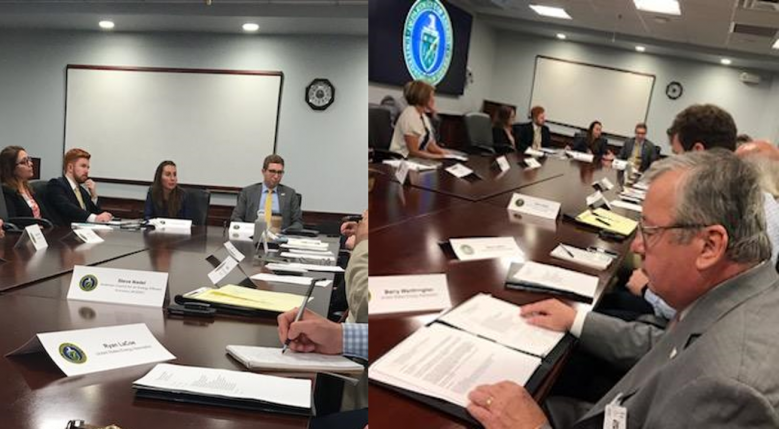
USEA chief tells DOE it should be ambassador for energy efficiency during critical time of abundance
Washington, D.C.—At a time when the U.S. is the largest oil and gas producer in the world and becoming a leading energy exporter, the Energy Department should be an ambassador for energy efficiency, USEA Executive Director Barry Worthington told DOE’s Office of Energy Efficiency and Renewable Energy (EERE) July 30 in Washington.
During DOE’s Stakeholder Roundtable Discussion on Energy Efficiency Tuesday, Worthington said, “The most important thing EERE should be doing right now within the Trump administration is stressing the urgency of energy efficiency, across the energy supply chain, even when we’re in an era of low prices and abundant supply.”
Christine Harbin, a DOE senior advisor for the Trump administration, organized the meeting of energy efficiency policy leaders with Alex Fitzsimmons, DOE’s Acting Deputy Assistant Secretary for its Office of Energy Efficiency and Renewable Energy.
Fitzsimmons said energy efficiency is often overlooked as a critical element in energy resource management and emissions reductions. Energy efficiency has helped reduce emissions and lower power costs for consumers. “Half of the electric power sector’s CO2 reduction is because of cost-effective energy efficiency,” Fitzsimmons said.
He added that the EERE office at DOE is arguably “the most interesting and diverse because it touches more segments of the economy.”
The Roundtable brought together a spectrum of efficiency experts who shared the value of efficiency and how it can transform various segments of the sector.
In a statement following the Roundtable, USEA Executive Director Barry Worthington said, “The world will double its energy demand by 2050, and efficiency can play a significant role in helping to meet that demand.
“We applaud Trump administration policies that support energy efficiency technologies that have lowered emissions and reduced power costs for consumers. And the industry is proud of its success, lowering prices, increasing supply. The average American family has an annual energy bill that is $1100 lower than what it would have been eight to ten years ago. The percentage of individual household consumption that is devoted to electricity is the lowest percentage on record.
“But we also urge EERE to continue to focus on its critical Weatherization Assistance Program because it doesn’t matter how low prices are if you can’t afford to pay your heating and cooling bill.
“DOE should also promote how its efficiency programs save the federal government money. The Federal Energy Management Program is an excellent example of an efficiency program that reduces the federal budget and does not increase the federal debt.
“Energy efficiency has a role in promoting national security. In the past month alone, even though our crude oil imports have fallen, there are still global energy hotspots we have to wrangle with; we are still integrated with the global economy.
“For every bit of crude oil or natural gas that we save domestically, we now can export to the global market. The value of those exports are jobs for Americans, a lower trade deficit, more leverage on trade issues and more support for our allies.
“I’m asking that EERE become the cheerleader within the Trump administration for energy efficiency, and stress that the energy production industry fully embrace the energy efficiency industry. We want all of our customers to use energy efficiency to the greatest degree that they can from a practical, economic standpoint.”
###
